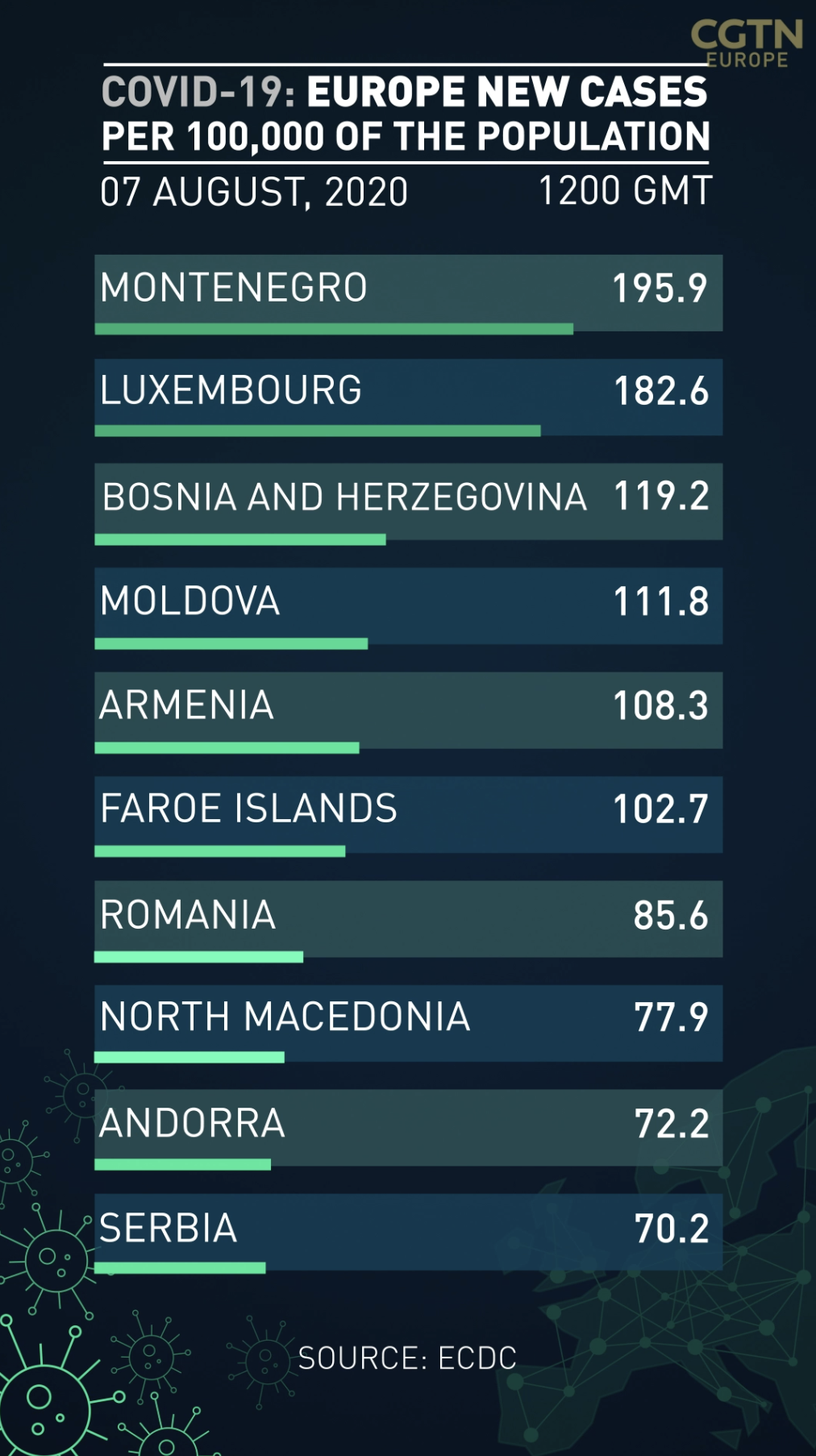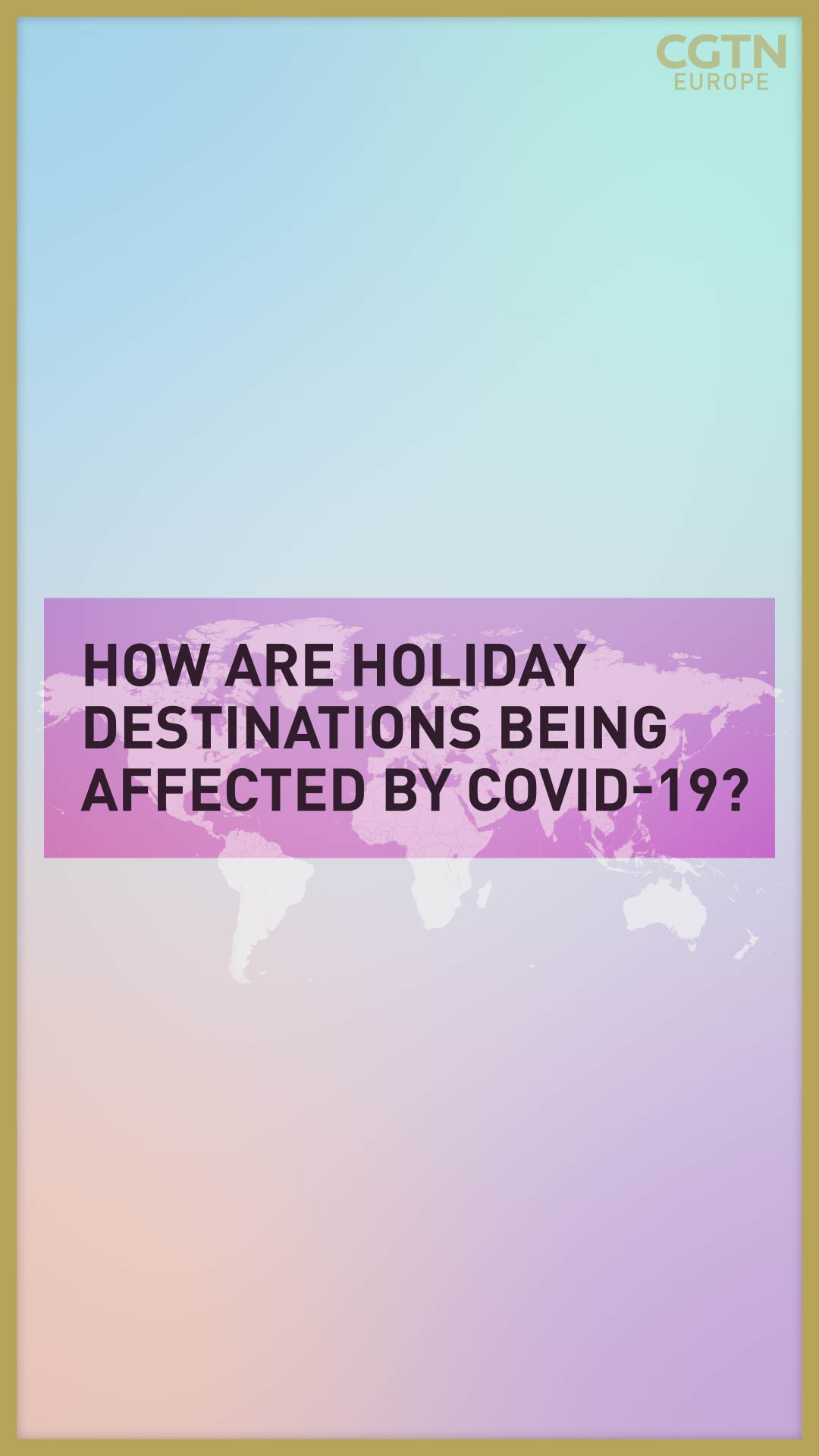TOP HEADLINES
- A total of 119,400 full-time jobs in the French private sector were lost, according to the INSEE statistics agency – the largest six-month decline since records began.
- Switzerland has signed an agreement with US biotech company Moderna for early access to the COVID-19 vaccine it is developing. The deal entitles Switzerland, which has a population of 8.6 million people, to 4.5 million doses of the vaccine.
- Spain has denied the country is facing a second wave of the virus, despite a sharp rise in cases in the past week. Fernando Simon, head epidemiologist at the health ministry, said: "It is not clear that the increase in detected cases isn't simply due to the increase in testing."
- Norway has urged its citizens to avoid all non-essential travel abroad to try to prevent a spike in cases in the country.
- Spain has put 32,000 people in the central town of Aranda Del Duero into lockdown after a spike in new infections.
- Hundreds of schoolchildren were sent home in Germany on Friday after a teacher tested positive for COVID-19. The teacher, from the Goethe-Gymnasium school in Ludwigslust, had not given any lessons since it reopened, but all 55 teachers will now have to be tested.
- Universities across France will reopen in September after almost six months closed. Students will be urged to wear face masks.
- Netherlands Prime Minister Mark Rutte has said the country doesn't need to put its citizens into a second lockdown, despite admitting "the virus is making a dangerous advance."
- Flights were delayed or canceled at Eindhoven Airport on Friday morning due to a shortage of available air traffic controllers, the airport said.
- The UK has added Belgium, Andorra and the Bahamas to its mandatory 10-day self-isolation list following spikes in all three countries. The finance minister, Rishi Sunak, said the country would not hesitate to add more countries to its quarantine list.
- Ukraine has recorded its highest new daily infections since the start of the pandemic. There have been 1,453 new cases reported in the past 24 hours, up from 1,318 the previous day.
- The World Health Organization has warned against "vaccine nationalism" and has called for the richest countries, which develop treatments for the virus, to help poorer nations to protect themselves.
- The 2020 London Marathon will be for elite runners only, its organizers have announced. It will be the first time in the race's 40-year history that amateur runners are not able to take part.

Thousands flouted social distancing regulations at Brighton beach, UK as a heatwave swept across Europe on Friday. /AFP
Thousands flouted social distancing regulations at Brighton beach, UK as a heatwave swept across Europe on Friday. /AFP
We have to roll up our sleeves, because we have a job to do – preventing the virus from forcing us to close the country again
- Bent Høie, Norway's health minister
ACROSS EUROPE
Iolo ap Dafydd in London
British tourists traveling to France are being warned they may have to quarantine for 14 days when they return.
It could be a huge blow to hundreds of thousands of holidaymakers as coronavirus infections in France increase – especially after realizing that Spain was less of an option for their holidays this summer.
The government says it is "closely monitoring" the situation as COVID-19 cases increase in several European nations.
Quarantine rules for people returning to Wales from Belgium, Andorra and the Bahamas are in place since midnight on Thursday.
The UK's three other nations will impose the same 14-day rule on Saturday. And the Foreign Office is soon expected to warn against all non-essential travel.
Within the UK, an update is expected on local lockdown measures in England's North West region and the city of Leicester. Meanwhile, the number of cases is increasing in the Scottish city of Aberdeen – up to 79, with more cases expected in the coming days.
Toni Waterman in Brussels
Belgium is now averaging 550 new coronavirus infections a day and other governments are taking note of the surge in new cases.
From Saturday, Belgians traveling to England or Wales will have to self-isolate for 14 days. Then on Monday, Finland will ban all non-essential travel from Belgium into the country.
Meanwhile, local authorities in the Brussels region say face masks will become mandatory in all public places if and when the regional average of new coronavirus cases passes the threshold of 50 infections per 100,000 inhabitants in a seven-day period. Currently, the capital region is recording 38 cases per 100,000 inhabitants.
John Bevir in Frankfurt
For the second day running there were more than 1,000 new daily coronavirus cases in Germany. With 1,147 confirmed infections reported and a further eight deaths, bringing total fatalities to 9,183.
The health minister has confirmed that from Saturday, travelers arriving in Germany from high-risk regions will be forced to have a coronavirus test – unless they bring proof of a recent negative result with them.
Jens Spahn admitted the rise in cases was worrying, but insisted that authorities could cope.
00:20

Alex Fraser in Milan
There were 402 new coronavirus cases in Italy in the past 24 hours.
The government is drawing up a new decree for the latest measures to help combat the virus and its threat to the Italian economy.
One of these policies will provide a 20 percent discount on all restaurant bills across the country to encourage people to eat out.
This week, confusion over social distancing rules meant high-speed train companies had to cancel more than 8,000 tickets at the beginning of Italy's August holiday season, when people travel from the major cities to the coastal and mountain regions.
Trains have been limited to just 50 percent capacity to enforce distancing, but at the weekend the ministry of transport appeared to indicate to train operators this could be relaxed.
Soon after the health minister announced that the seating restrictions would be remaining, which caused disruption to people's holiday plans at the beginning of the week.
Stefan de Vries in Amsterdam
In response to the increase of COVID-19 infections, the Dutch government has tightened up its rules.
In a press conference on Thursday, Prime Minister Mark Rutte announced that from now on, all clients in cafés and restaurants will have to sit down.
They will also be asked to give their name and contact details, so they can be traced in case of an outbreak. In addition, travellers at Amsterdam's Schiphol Airport, Europe's third busiest, arriving from countries with a high number of cases, will be asked to take a test on the spot.
Since there are significant regional differences, mayors can opt for even stricter local rules.
Rutte stressed that "corona is no game" and called on people to take responsibility and strictly follow the guidelines. "I hope and think that we are not a country of toddlers. We can do this together."
Most of the rules are voluntary. Rutte said: "We are all adults in a mature democracy. Not a dictatorship where I can put a policeman in front of every door."
Yesterday, there were 601 new cases in The Netherlands, the highest number in almost three months. Although the number of tests is now much higher than last May.
00:49

FROM OUR GLOBAL COLLEAGUES
CGTN Europe podcast: Notes on a pandemic: Science rules
CGTN China: Six COVID-19 vaccine candidates in phase three trials, three from China
CGTN America: AMC expects to reopen all international theaters in three weeks
CGTN Africa: Ghanaian schools reschedule academic year due to COVID-19
Sign up here to get the COVID-19 Europe bulletin sent directly to your inbox
CGTN Europe has been providing in-depth coverage of the novel coronavirus story as it has unfolded. Here you can read the essential information about the crisis.